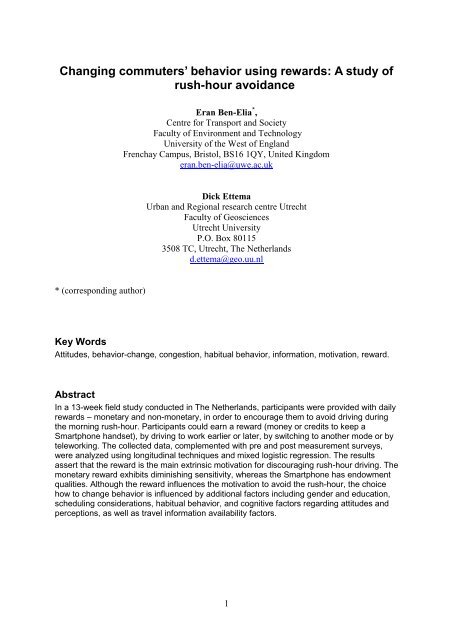Ben-Elia, E. and Ettema, D. (2011) Changing commuters' behav- ior ...
Ben-Elia, E. and Ettema, D. (2011) Changing commuters' behav- ior ...
Ben-Elia, E. and Ettema, D. (2011) Changing commuters' behav- ior ...
Create successful ePaper yourself
Turn your PDF publications into a flip-book with our unique Google optimized e-Paper software.
<strong>Changing</strong> commuters’ <strong>behav</strong><strong>ior</strong> using rewards: A study of<br />
rush-hour avoidance<br />
* (corresponding author)<br />
Eran <strong>Ben</strong>-<strong>Elia</strong> * ,<br />
Centre for Transport <strong>and</strong> Society<br />
Faculty of Environment <strong>and</strong> Technology<br />
University of the West of Engl<strong>and</strong><br />
Frenchay Campus, Bristol, BS16 1QY, United Kingdom<br />
eran.ben-elia@uwe.ac.uk<br />
Dick <strong>Ettema</strong><br />
Urban <strong>and</strong> Regional research centre Utrecht<br />
Faculty of Geosciences<br />
Utrecht University<br />
P.O. Box 80115<br />
3508 TC, Utrecht, The Netherl<strong>and</strong>s<br />
d.ettema@geo.uu.nl<br />
Key Words<br />
Attitudes, <strong>behav</strong><strong>ior</strong>-change, congestion, habitual <strong>behav</strong><strong>ior</strong>, information, motivation, reward.<br />
Abstract<br />
In a 13-week field study conducted in The Netherl<strong>and</strong>s, participants were provided with daily<br />
rewards – monetary <strong>and</strong> non-monetary, in order to encourage them to avoid driving during<br />
the morning rush-hour. Participants could earn a reward (money or credits to keep a<br />
Smartphone h<strong>and</strong>set), by driving to work earlier or later, by switching to another mode or by<br />
teleworking. The collected data, complemented with pre <strong>and</strong> post measurement surveys,<br />
were analyzed using longitudinal techniques <strong>and</strong> mixed logistic regression. The results<br />
assert that the reward is the main extrinsic motivation for discouraging rush-hour driving. The<br />
monetary reward exhibits diminishing sensitivity, whereas the Smartphone has endowment<br />
qualities. Although the reward influences the motivation to avoid the rush-hour, the choice<br />
how to change <strong>behav</strong><strong>ior</strong> is influenced by additional factors including gender <strong>and</strong> education,<br />
scheduling considerations, habitual <strong>behav</strong><strong>ior</strong>, <strong>and</strong> cognitive factors regarding attitudes <strong>and</strong><br />
perceptions, as well as travel information availability factors.<br />
1

















